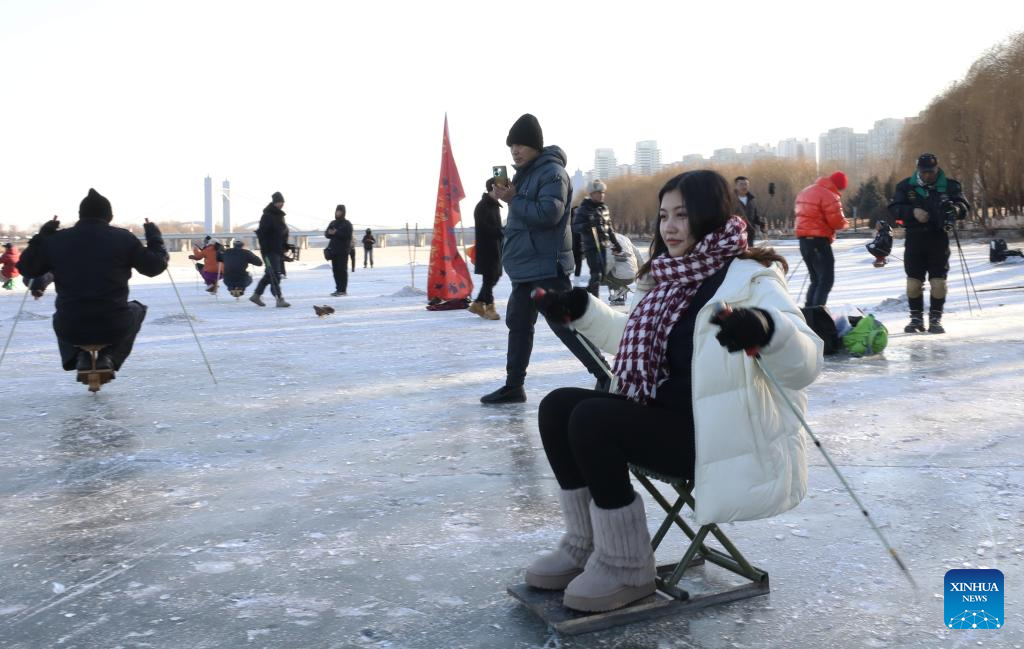
Heloise Gentil, who lived in the Chinese capital for more than 10 years, forged a very special bond with Beijing and the Olympics.
"I had worked as a French translator for the Beijing Olympics in 2008 and then a project expert for the organizing committee for the 2022 Beijing Winter Olympics," she said.
Now, Gentil, who is in her 40s, works in France as a sports expert to promote the legacy of the Paris 2024 Olympic Games in collaboration with government agencies. She is involved in initiatives such as helping unemployed people regain their spirit and reestablish their connection with society through sports.
"For China, the major legacy of the Beijing Winter Games is the leapfrog development of the country's entire winter sports industry," Gentil said. "This wouldn't have been possible without the high attention from the Chinese leader to winter sports."
She added that she expects the upcoming 2025 Asian Winter Games, which will open on Friday and run through Feb 14, to further promote winter sports in China and in Asia overall.

Gentil recalled that when President Xi Jinping inspected the preparatory work for Beijing Winter Olympics in 2019, he emphasized that the hosting of the Games was hard-won and of great significance, and called for efforts to fulfill the solemn promise that China had made to the world.
"I had a brief conversation with the Chinese president after shaking hands with him and I expressed my gratitude for his support for our work," she said.
In the eyes of Gentil, the Olympics are not just a two-week sporting event. "Both China and France have been working actively to bring out more legacy from the Olympics," she said.
Gentil said she fully agreed with Xi when he said that the most important aspect of the Olympic spirit is to popularize sports, promote mass participation in sports and improve people's health.
"He was not just thinking about it, but has managed to make this idea come true," Gentil said.
ALSO READ: Winter sports on fast track
Three months after Beijing and Zhangjiakou, Hebei province, launched a joint bid in 2013 to host the 2022 Beijing Winter Olympics, Xi went to Sochi, Russia, to attend the opening ceremony of the XXII Olympic Winter Games in February 2014. It was the first time that a Chinese head of state had attended a large-scale international sporting event abroad.
During the trip, Xi told International Olympic Committee President Thomas Bach that winter sports mainly prevailed in northeastern China, and a nationwide rollout to popularize such sports was expected to involve around 200 million to 300 million people.

It was the first time that the country's initiative to get 300 million people involved in winter sports was put forward.
Gentil said that she and her family have witnessed and are also beneficiaries of the Beijing Winter Games' legacy.
"After the Games concluded, Beijing has improved various aspects related to winter sports activities, from venues to transportation and medical services, offering more ordinary people an option for skiing and skating during the weekend," she said.
In addition, in China's southern regions, where people are less familiar with winter sports, many indoor venues have been established to give people there access to ice and snow activities, she added.

Official statistics showed that as of 2023, there were 2,847 ice and snow sports venues nationwide — 1,912 ice skating venues and 935 skiing venues — and these are not distributed only in the ice- and snow-rich regions of China. For example, by the end of 2023, South China's Guangdong province had 24 ice skating venues and 10 skiing venues.
Gentil said she believes that these remarkable achievements have been made because President Xi understands the benefits of sports for the country and has implemented many sports-related policies to encourage people to participate more in sports.
Speaking at a review and awards ceremony of the Beijing Winter Olympics, Xi said the goal of involving 300 million people in ice and snow activities has come true, with people's sense of fulfillment being enhanced.
In a letter sent to Xi by Bach soon after the successful conclusion of the Games in 2022, the IOC chief said that under Xi's exceptional leadership, China has joined the ranks of winter sports countries.
This is a valuable asset left by the Games and has opened a new era for global winter sports, Bach added.

Yang Xuedong, director of the Sports Economy Department of the General Administration of Sport, said that statistics from research on public participation in ice and snow sports showed that since the Games, the Chinese people's enthusiasm for winter sports continues to grow.
Around 313 million people have engaged in ice and snow sports or related leisure activities in China since then, Yang said.
As the latest international comprehensive winter sports event held in China since the Beijing Winter Games, the 9th Asian Winter Games, which will be held in Harbin, Heilongjiang province, will help promote the growth of winter sports' popularity in Asia, said Yu Zaiqing, a member of the International Olympic Committee.
READ MORE: China witnesses 313 million people engaging in winter sports after Beijing 2022
"Beijing 2022 was a driving force to expand the winter sports population in China," Yu told Xinhua News Agency on Monday during a torch relay for the Asian Winter Games. "The Harbin Asian Winter Games will also be conducive to promoting winter sports and cultivating talent, leaving lasting cultural, social and sports legacies."


